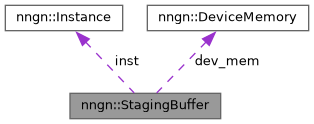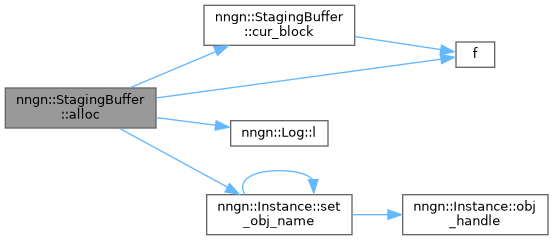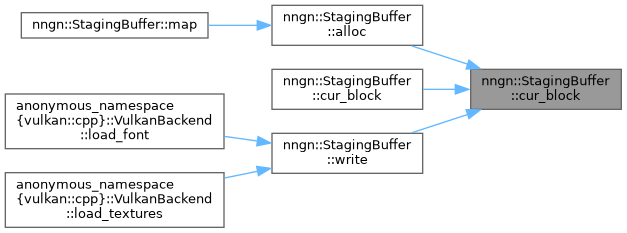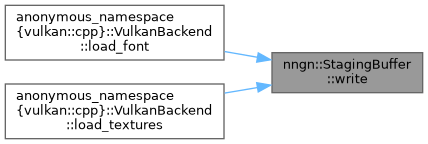Manages staging buffers for a group of frames. More...
#include <staging.h>

Classes | |
| struct | Allocation |
| Result of a block allocation. More... | |
| struct | Frame |
| Data for a single frame. More... | |
| struct | FreeBuffer |
| Buffer in the free list, ready to be reused. More... | |
| struct | MappedRegion |
| Region mapped for writting. More... | |
Public Types | |
| using | Stats = GraphicsStats::Staging |
Public Member Functions | |
| StagingBuffer (void)=default | |
| ~StagingBuffer (void) | |
| Releases all buffers and device memory allocated. | |
| void | init (const Instance &inst, VkDevice dev, DeviceMemory *dev_mem, VkDeviceSize default_size) |
| Stats | stats (std::size_t i) const |
| void | resize (std::size_t n) |
Resizes to accommodate n frames. | |
| bool | write (std::size_t i, VkDeviceSize n, VkDeviceSize size, auto &&f) |
| Writes data for a frame, allocating extra memory as necessary. | |
| void | destroy (std::size_t i) |
Releases resources for frame i. | |
Private Member Functions | |
| const DedicatedBuffer * | cur_block (std::size_t i) const |
| DedicatedBuffer * | cur_block (std::size_t i) |
| Allocation | alloc (std::size_t i, VkDeviceSize n, VkDeviceSize size) |
Allocates at most n blocks of size bytes for frame i. | |
| MappedRegion | map (std::size_t i, VkDeviceSize n, VkDeviceSize size) |
| Maps a writeable region, allocating if necessary. | |
| void | retire_free () |
| Removes old unused buffers from the free list. | |
Private Attributes | |
| std::vector< Frame > | frames = {} |
| std::vector< FreeBuffer > | free = {} |
| const Instance * | inst = {} |
| VkDevice | dev = {} |
| DeviceMemory * | dev_mem = {} |
| VkDeviceSize | default_size = {} |
Detailed Description
Manages staging buffers for a group of frames.
Allocates buffers and device memory in blocks as necessary for each new data block that is written.
Member Typedef Documentation
◆ Stats
Constructor & Destructor Documentation
◆ StagingBuffer()
|
default |
◆ ~StagingBuffer()
| nngn::StagingBuffer::~StagingBuffer | ( | void | ) |
Releases all buffers and device memory allocated.
Member Function Documentation
◆ alloc()
|
private |
Allocates at most n blocks of size bytes for frame i.
Depending on the capacity cap of the current active block:
- if
cap >= n * size, no allocation is performed - if
size <= cap && cap < n * size, no allocation is performed - if
cap < size, a new block of sizen * sizeis allocated In all cases, the returned allocation information hasnequal to the number of blocks that should be written to the buffer, which may be less than thenparameter for case 2.


◆ cur_block() [1/2]
|
inlineprivate |

◆ cur_block() [2/2]
|
inlineprivate |


◆ destroy()
| void nngn::StagingBuffer::destroy | ( | std::size_t | i | ) |
Releases resources for frame i.


◆ init()
|
inline |

◆ map()
|
private |
Maps a writeable region, allocating if necessary.
- Parameters
-
i frame index n number of elements size size of each element

◆ resize()
|
inline |
Resizes to accommodate n frames.


◆ retire_free()
|
private |
Removes old unused buffers from the free list.
A buffer is removed if it has not been used for a full cycle of the total number of frames (i.e. size(this->frames)) since it was allocated. Regardless of age, a minimum of size(this->frames) is kept in the list.


◆ stats()
| auto nngn::StagingBuffer::stats | ( | std::size_t | i | ) | const |


◆ write()
|
inline |
Writes data for a frame, allocating extra memory as necessary.
- Parameters
-
i frame index n number of elements size size of each element f Callable that generates the data. Parameters: VkBuffer dst: target buffervoid *p: memory blockVkDeviceSize off: offset indstVkDeviceSize i: base index (<= n)VkDeviceSize nw: number of elements (<= n - i)


Member Data Documentation
◆ default_size
|
private |
◆ dev
|
private |
◆ dev_mem
|
private |
◆ frames
|
private |
◆ free
|
private |
◆ inst
The documentation for this class was generated from the following files:
- src/graphics/vulkan/staging.h
- src/graphics/vulkan/staging.cpp